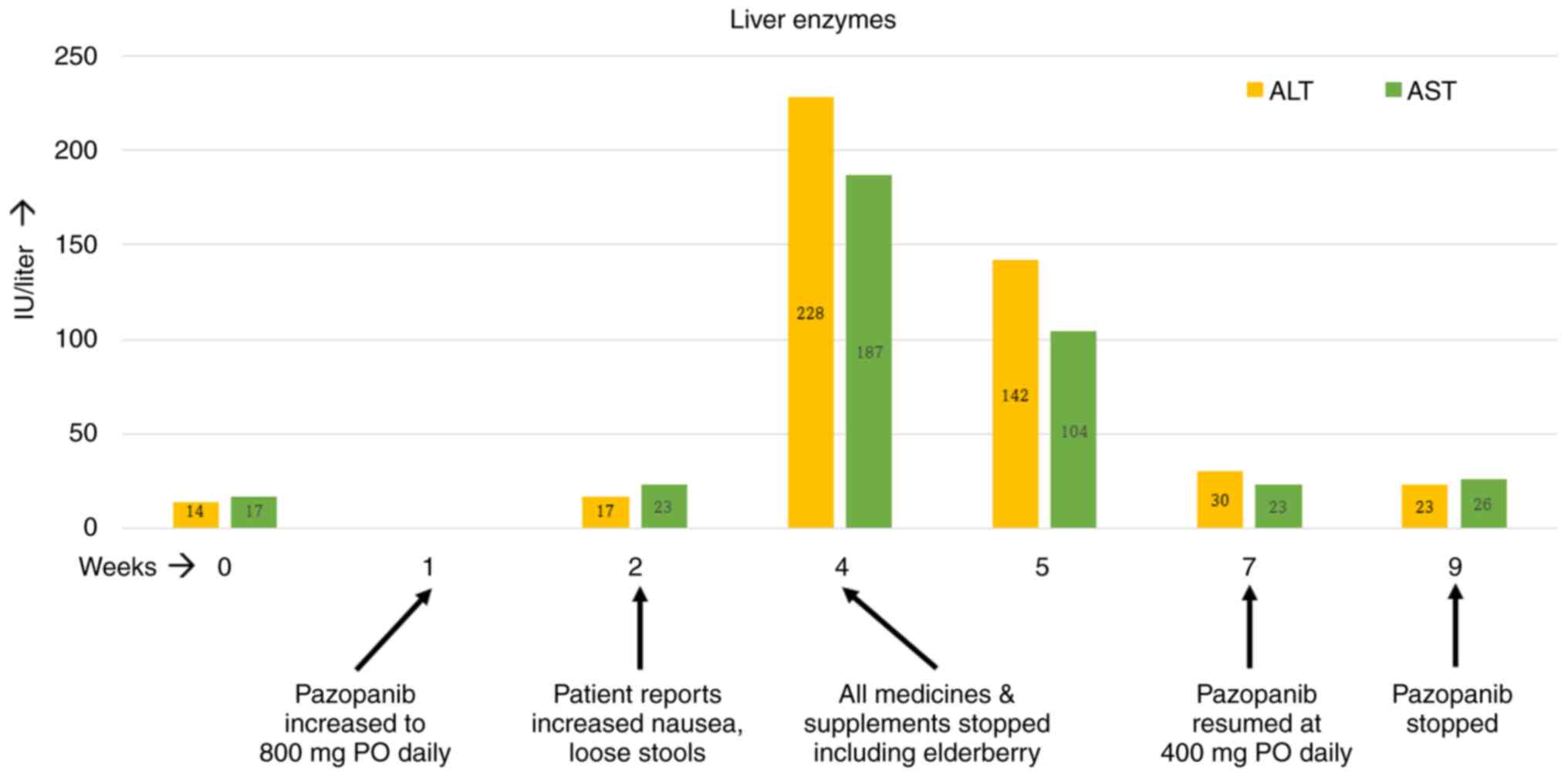|
1
|
Riechelmann RP, Tannock IF, Wang L, Saad
ED, Taback NA and Krzyzanowska MK: Potential drug interactions and
duplicate prescriptions among cancer patients. J Natl Cancer Inst.
99:592–600. 2007.PubMed/NCBI View Article : Google Scholar
|
|
2
|
Kessel KA, Lettner S, Kessel C, Bier H,
Biedermann T, Friess H, Herrschbach P, Gschwend JE, Meyer B,
Peschel C, et al: Use of complementary and alternative medicine
(CAM) as part of the oncological treatment: Survey about patients'
attitude towards CAM in a university-based oncology center in
Germany. PLoS One. 11(e0165801)2016.PubMed/NCBI View Article : Google Scholar
|
|
3
|
Buckner CA, Lafrenie RM, Dénommée JA,
Caswell JM and Want DA: Complementary and alternative medicine use
in patients before and after a cancer diagnosis. Curr Oncol.
25:e275–e281. 2018.PubMed/NCBI View Article : Google Scholar
|
|
4
|
Choudhury NR: Elderberry supplements
market outlook (2023 to 2033). https://www.futuremarketinsights.com/reports/elderberry-supplements-market.
Accessed November 19, 2023.
|
|
5
|
Adams KK, Baker WL and Sobieraj DM: Myth
busters: Dietary supplements and COVID-19. Ann Pharmacother.
54:820–826. 2020.PubMed/NCBI View Article : Google Scholar
|
|
6
|
Schutz FA, Choueiri TK and Sternberg CN:
Pazopanib: Clinical development of a potent anti-angiogenic drug.
Crit Rev Oncol Hematol. 77:163–171. 2011.PubMed/NCBI View Article : Google Scholar
|
|
7
|
Lee ATJ, Jones RL and Huang PH: Pazopanib
in advanced soft tissue sarcomas. Signal Transduct Target Ther.
4(16)2019.PubMed/NCBI View Article : Google Scholar
|
|
8
|
van Meekeren M, Bovee J, van Coevorden F,
van Houdt W, Schrage Y, Koenen AM, Miah AB, Zaidi S, Hayes AJ,
Thway K, et al: A phase II study on the neo-adjuvant combination of
pazopanib and radiotherapy in patients with high-risk, localized
soft tissue sarcoma. Acta Oncol. 60:1557–1564. 2021.PubMed/NCBI View Article : Google Scholar
|
|
9
|
Weiss AR, Chen YL, Scharschmidt TJ, Xue W,
Gao Z, Black JO, Choy E, Davis JL, Fanburg-Smith JC, Kao SC, et al:
Outcomes after preoperative chemoradiation with or without
pazopanib in non-rhabdomyosarcoma soft tissue sarcoma: A report
from Children's oncology group and NRG oncology. J Clin Oncol.
41:4842–4848. 2023.PubMed/NCBI View Article : Google Scholar
|
|
10
|
National Center for Complementary and
Integrative Health: Elderberry. National Institutes of Health,
2020. https://www.nccih.nih.gov/health/elderberry. Accessed
November 19, 2023.
|
|
11
|
Ulbricht C, Basch E, Cheung L, Goldberg H,
Hammerness P, Isaac R, Khalsa KP, Romm A, Rychlik I, Varghese M, et
al: An evidence-based systematic review of elderberry and
elderflower (Sambucus nigra) by the natural standard research
collaboration. J Diet Suppl. 11:80–120. 2014.PubMed/NCBI View Article : Google Scholar
|
|
12
|
Pembleton M: Can elderberry treat the flu?
The New York Times. NYT Parenting, 2020. https://www.nytimes.com/2020/04/17/parenting/elderberry-benefits-dangers.html.
Accessed September 23, 2023.
|
|
13
|
Zakay-Rones Z, Varsano N, Zlotnik M, Manor
O, Regev L, Schlesinger M and Mumcuoglu M: Inhibition of several
strains of influenza virus in vitro and reduction of symptoms by an
elderberry extract (Sambucus nigra L.) during an outbreak of
influenza B Panama. J Altern Complement Med. 1:361–369.
1995.PubMed/NCBI View Article : Google Scholar
|
|
14
|
Zakay-Rones Z, Thom E, Wollan T and
Wadstein J: Randomized study of the efficacy and safety of oral
elderberry extract in the treatment of influenza A and B virus
infections. J Int Med Res. 32:132–140. 2004.PubMed/NCBI View Article : Google Scholar
|
|
15
|
Tiralongo E, Wee SS and Lea RA: Elderberry
supplementation reduces cold duration and symptoms in
air-travellers: A randomized, double-blind placebo-controlled
clinical trial. Nutrients. 8(182)2016.PubMed/NCBI View Article : Google Scholar
|
|
16
|
Centers for Disease Control (CDC).
Poisoning from elderberry juice-California. MMWR Morb Mortal Wkly
Rep. 33:173–174. 1984.PubMed/NCBI
|
|
17
|
Zhou SF, Xue CC, Yu XQ, Li C and Wang G:
Clinically important drug interactions potentially involving
mechanism-based inhibition of cytochrome P450 3A4 and the role of
therapeutic drug monitoring. Ther Drug Monit. 29:687–710.
2007.PubMed/NCBI View Article : Google Scholar
|
|
18
|
Schrøder-Aasen T, Molden G and Nilsen OG:
In vitro inhibition of CYP3A4 by the multiherbal commercial product
Sambucus force and its main constituents Echinacea purpurea and
Sambucus nigra. Phytother Res. 26:1606–1613. 2012.PubMed/NCBI View
Article : Google Scholar
|
|
19
|
Thorn CF, Sharma MR, Altman RB and Klein
TE: PharmGKB summary: Pazopanib pathway, pharmacokinetics.
Pharmacogenet Genomics. 27:307–312. 2017.PubMed/NCBI View Article : Google Scholar
|
|
20
|
Langhammer AJ and Nilsen OG: In vitro
inhibition of human CYP1A2, CYP2D6, and CYP3A4 by six herbs
commonly used in pregnancy. Phytother Res. 28:603–610.
2014.PubMed/NCBI View
Article : Google Scholar
|
|
21
|
Mangla A and Yadav U: Leiomyosarcoma.
StatPearls Publishing, Treasure Island, FL, 2023.
|
|
22
|
Mangla A: Should neoadjuvant treatment be
adopted more widely for patients with extremity soft tissue sarcoma
in low-income countries? JCO Glob Oncol. 9(e2300110)2023.PubMed/NCBI View Article : Google Scholar
|
|
23
|
Hurwitz HI, Dowlati A, Saini S, Savage S,
Suttle AB, Gibson DM, Hodge JP, Merkle EM and Pandite L: Phase I
trial of pazopanib in patients with advanced cancer. Clin Cancer
Res. 15:4220–4227. 2009.PubMed/NCBI View Article : Google Scholar
|
|
24
|
Kolesarova A, Baldovska S, Kohut L and
Sirotkin AV: Black elder and its constituents: Molecular mechanisms
of action associated with female reproduction. Pharmaceuticals
(Basel). 15(239)2022.PubMed/NCBI View Article : Google Scholar
|
|
25
|
Thakkar S, Anklam E, Xu A, Ulberth F, Li
J, Li B, Hugas M, Sarma N, Crerar S, Swift S, et al: Regulatory
landscape of dietary supplements and herbal medicines from a global
perspective. Regul Toxicol Pharmacol. 114(104647)2020.PubMed/NCBI View Article : Google Scholar
|















